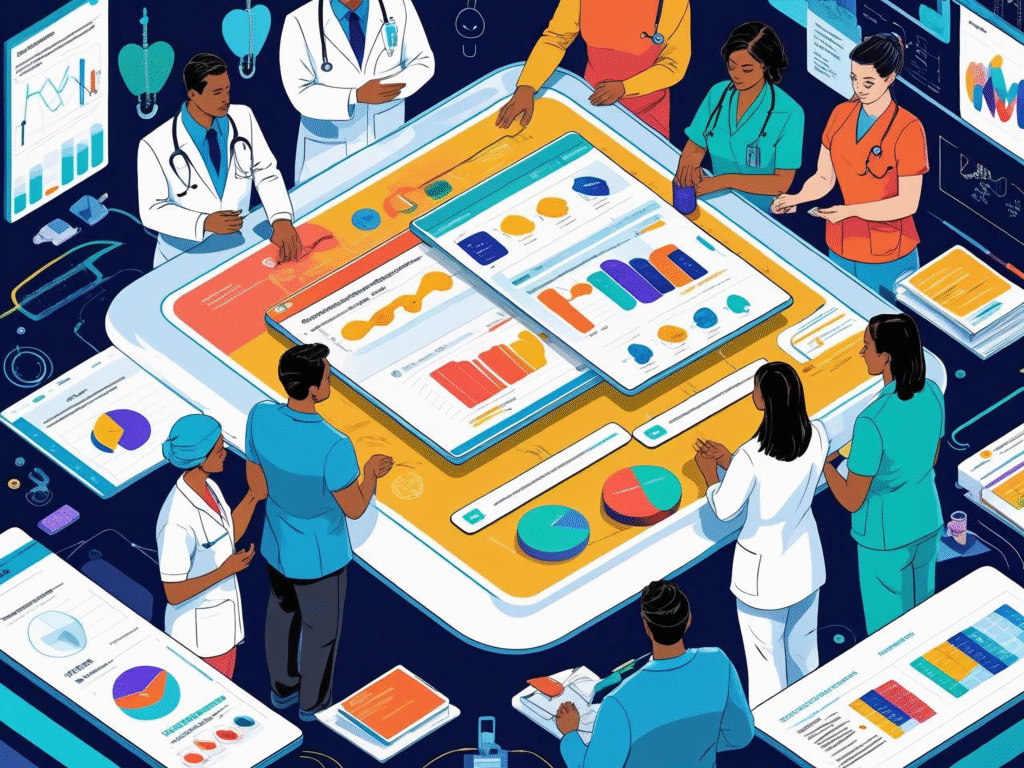
Predictive Analytics in Primary Care Settings
- June 23, 2025
- 0 Likes
- 349 Views
- 0 Comments
Abstract
Predictive analytics—the use of historical and real-time data to forecast future health events—is transforming global healthcare systems. In Africa, where primary care systems are often the first and only point of contact for most patients, predictive tools can support early diagnosis, prevent hospitalizations, and improve population health outcomes. This white paper examines the opportunities and limitations of deploying predictive analytics in African primary care settings and recommends strategies for implementation.
Introduction
Primary healthcare in Africa faces significant challenges: high patient loads, understaffed clinics, and limited diagnostic infrastructure (WHO, 2022). Predictive analytics, powered by machine learning and AI, has the potential to support these overburdened systems by forecasting individual and population-level health risks. In settings with limited resources, this can mean the difference between reactive and proactive care.
“A predictive primary care model could save lives by enabling earlier diagnosis of TB, diabetes, or hypertensive emergencies in rural communities.”
— Africa CDC Digital Health Strategy, 2021
What Is Predictive Analytics in Healthcare?
Predictive analytics involves applying statistical models and machine learning algorithms to historical and current health data to forecast clinical events, such as:
- The likelihood of a patient developing diabetes or hypertension
- Risk of hospital readmission
- Probability of treatment non-adherence
- Anticipated outbreaks or disease surges in a community
In primary care, predictive analytics can help clinicians prioritize high-risk patients, allocate resources, and tailor interventions.

Applications in African Primary Care Settings
1. Chronic Disease Risk Stratification
AI models can identify patients likely to develop cardiovascular disease, diabetes, or kidney failure based on EMR, lifestyle, and demographic data.
Example: In South Africa, Discovery Health used predictive analytics to flag patients at risk for diabetes, increasing early diagnosis by 30% (Discovery, 2021).
Source
2. Maternal and Neonatal Health
Predictive tools can flag high-risk pregnancies by analyzing vitals, antenatal care attendance, and social determinants.
Case Study: The MomConnect program in South Africa incorporated predictive messaging for antenatal complications.
Source
3. Outbreak Prediction
By combining primary care data with weather, mobility, and laboratory records, predictive models can anticipate outbreaks of malaria, cholera, or respiratory infections.
WHO Regional Office (2023) supports malaria early warning systems integrating local health data and environmental surveillance.
Source
4. Reducing Missed Appointments and Non-Adherence
SMS and chatbot-based reminders powered by predictive analytics can identify which patients are likely to miss appointments or abandon treatment plans.
Benefits of Predictive Analytics in Primary Care
| Benefit | Description |
|---|---|
| Early Intervention | Enables timely diagnosis and treatment before conditions escalate |
| Resource Optimization | Helps clinics prioritize patients and supplies more effectively |
| Improved Outcomes | Reduces complications and hospitalizations |
| Population Health Insights | Aggregated data can inform district and national health strategies |
| Cost-Effectiveness | Lowers treatment costs through preventive action |
Implementation Challenges
1. Data Quality & Fragmentation
Primary care data in many African countries is incomplete, paper-based, or inconsistently digitized. Predictive models need clean, structured data to function accurately.
2. Limited Infrastructure
Many facilities lack reliable electricity, connectivity, or computing capacity to support AI applications.
3. Bias & Equity Concerns
Algorithms trained on non-African or urban datasets may yield poor results in rural or marginalized communities.
4. Trust and Adoption
Frontline healthcare workers may distrust or misunderstand AI predictions without sufficient training or decision-support design.
5. Ethical and Regulatory Gaps
Most African countries lack clear guidelines for the ethical use of AI in patient-facing healthcare applications (UNECA, 2022).
Recommendations
1. Invest in Health Data Infrastructure
Prioritize digitization of primary care records, EMRs, and integration with community health data systems.
2. Use Contextualized AI Models
Develop and train predictive models on African datasets, including rural populations and diverse health profiles.
3. Start with Pilot Projects
Launch controlled pilots in high-burden areas (e.g., maternal health, TB clinics) to test use cases and gather feedback.
4. Upskill Primary Care Providers
Train health workers to interpret and use predictive outputs with clinical judgment, rather than replacing their expertise.
5. Develop Ethical AI Guidelines
National digital health strategies should include frameworks for responsible, inclusive AI and predictive analytics.
Tools and Technologies in Use
- DHIS2 Predictive Modules – Used in over 30 African countries for health data forecasting
https://www.dhis2.org/ - TensorFlow Health Tools – Open-source ML libraries for disease prediction
https://www.tensorflow.org/ - RapidPro & OpenSRP – Platforms for decision support and mobile outreach
Conclusion
Predictive analytics can play a pivotal role in strengthening Africa’s primary healthcare systems. From risk scoring to outbreak anticipation, these tools empower clinicians to shift from reactive to preventive care. But success depends on high-quality data, ethical safeguards, and a skilled workforce that trusts and understands AI-driven tools.
References
Discovery Health. (2021). Improving patient outcomes with data.
https://www.discovery.co.za/
South African Department of Health. (2022). MomConnect: Digitizing maternal care in South Africa.
https://www.health.gov.za/momconnect/
United Nations Economic Commission for Africa (UNECA). (2022). Responsible AI in African digital health systems.
https://repository.uneca.org/handle/10855/46742
World Health Organization. (2022). Primary health care and health systems resilience.
https://www.who.int/news/item/22-06-2022-primary-health-care-and-health-systems-resilience
World Health Organization Regional Office for Africa. (2023). Malaria early warning systems in Africa.
https://apps.who.int/iris/handle/10665/365017



Leave Your Comment